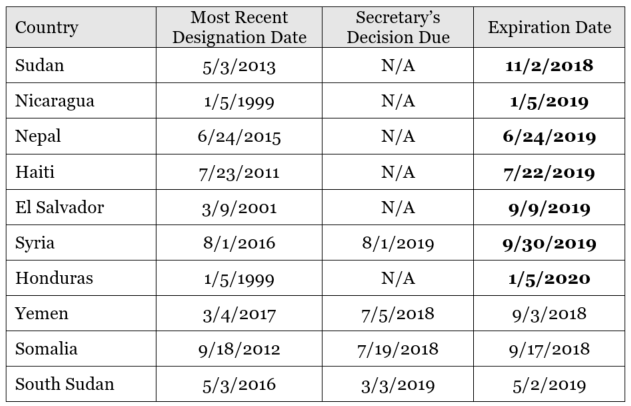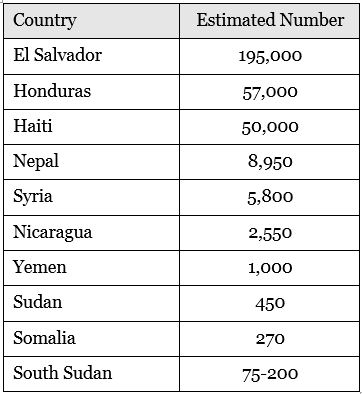
Fact Sheet: Temporary Protected Status
Policy and Advocacy Associate
May 5, 2018
Temporary Protected Status (TPS) is granted by the Secretary of U.S. Department of Homeland Security (Secretary) to eligible foreign born individuals, who are unable to return home safely due to conditions or circumstances preventing their country from adequately handling the return.
When can the Secretary designate a country for TPS?
The Secretary can designate a country for TPS due to:
- Ongoing armed conflict (such as civil war),
- An environmental disaster (such as earthquake or hurricane), or an epidemic, or
- Other extraordinary and temporary conditions.
Who is eligible for TPS?
TPS can be granted to an individual who is a national of a country designated for TPS and meets other requirements and has been continuously physically present in the U.S. since specific dates.
What TPS means for the eligible individuals?
During a designated period, TPS holders are:
- Not removable from the U.S. and not detainable by DHS on the basis of his or her immigration status,
- Eligible for an employment authorization document (EAD), and
- Eligible for travel authorization.
How many individuals are currently granted TPS?
The U.S. currently provides TPS to over 300,000 foreign nationals from the following countries:
Where do TPS holders live?
TPS holders reside all over the U.S. Most TPS holders from El Salvador live in the Washington, DC (32,359), Los Angeles (30,415) and New York (23,168) metropolitan areas. Honduran TPS holders live mostly in the New York (8,818), Miami (7,467) and Houston (6,060) metropolitan areas. Haitian TPS holders live mainly in the Miami (16,287), New York (9,402) and Boston (4,302) metropolitan areas.
When do TPS designations expire?

The Secretary can extend TPS after a review of country conditions. A decision about a 6, 12 or 18 month extension must be made at least 60-days before the TPS designation expiration date.
For example, the Secretary most recently ended TPS for Honduras. Previously, the Secretary extended but not re-designated TPS status for Syrians. She also terminated TPS for Nepal, El Salvador, Haiti, Sudan and Nicaragua, but extended TPS for eligible immigrants from South Sudan through May 2019.
How do TPS holders contribute to our economy?
Recent data estimate that TPS holders from El Salvador, Honduras, and Haiti contribute a combined $4.5 billion in pre-tax wages or salary income annually to our nation’s gross domestic product. Total Social Security and Medicare contributions of those individuals is estimated at more than $6.9 billion over a decade.
Where do TPS holders work?
According to a recent survey of TPS holders from El Salvador and Honduras, overall 88.5% are working — 94 percent of men and 82 percent of women. Male TPS holders work in the following sector or occupation: construction/painting (23 percent), driving/delivery (13.7 percent), cleaning buildings or houses (7.3 percent), gardener (5.4 percent), cook (3.9 percent), or store clerk (2.5 percent). Female TPS holders are concentrated in cleaning buildings or houses (27.9 percent), childcare (6.6 percent), cook (5.2 percent), clothing factory (4 percent), or store clerk (3.8 percent).


